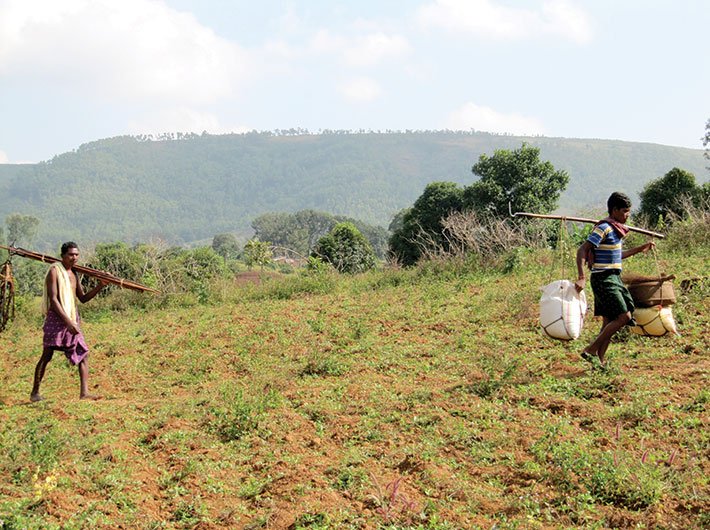A panel to take care of the interests of marginal people is pushed to the margins
Jharkhand is on the boil over acquisition of tribal land. On October 5, four people were killed and more than a dozen injured while protesting against a coal mining project of NTPC, a Maharatna PSU. In September, more than 40,000 people from 11 districts of Jharkhand gathered in the state capital Ranchi to demonstrate against the government for issuing an ordinance to open tribal land for commercial and non-agricultural use.
The tribals are clearly quite peeved. Amid this turmoil, the National Commission for Scheduled Tribes (NCST), an independent body framed as per the provisions under the constitution to safeguard the rights of tribal population, is making concerted efforts to prevent the alienation of tribals from their lands.
Being a government watchdog, the commission has recommended to the president not to give his assent to the ordinance which seeks amendments in the Chotanagpur Tenancy Act, 1908 and Santhal Pargana Tenancy Act, 1949. These are the two special laws governing the scheduled areas of Jharkhand and restricts the alienation of tribals from their land.
The commission in its report has rejected the opening of tribal land for non-tribal purposes, citing violation of constitutional safeguards.
But the commission was given a short shrift by the Jharkhand government. “The constitution mandates that the union and every state government shall consult the commission on all major policy matters affecting scheduled tribes. But the Jharkhand government violated it,” NCST chairperson Rameshwar Oraon told Governance Now.
READ INTERVIEW: “I admit we cannot do much”
A brief history
According to the 2011 census data, India is home to 10,42,81,034 people who fall in the category of scheduled tribes. The term ‘scheduled tribes’ first appeared in the constitution of India. Article 366 (25) defined scheduled tribes as “such tribes or tribal communities or parts of or groups within such tribes or tribal communities as are deemed under Article 342 to be Scheduled Tribes for the purposes of this constitution”.
The framers of the constitution took note of the fact that certain communities were suffering from extreme social, educational and economic backwardness due to their geographical isolation and age-old practices. Therefore, to provide the constitutional safeguards, a commission was appointed – National Commission for Scheduled Castes and Scheduled Tribes.
After the Eighty-Ninth Amendment Act, 2003, two separate commissions were formed in 2004 – one dedicated to the SCs and the other for STs.
Many tribal communities still have very little contact with the mainstream population and they are geographically isolated.
The ST commission has to safeguard rights of the tribal communities over mineral resources and water resources, improve the efficacy of relief and rehabilitation measures and reduce and ultimately eliminate the practice of shifting cultivation that leads to their continuous disempowerment and degradation of land.
Ground reality
Take for instance the Rourkela Steel Plant in Odisha, which was started in the late 1950s. As many as 32 villages were acquired, affecting 4,094 families. The commission is still receiving reports from the state government of non-payment of compensation to those whose land were acquired, unemployment of the displaced families, and allotment of land in lieu of their land being acquired. Despite the cases being over five decades old, they are yet to be resolved. Similar is the case with Sardar Sarovar Project in Gujarat.
NCST’s role is to inquire, monitor and follow up on proper compensation or suggest framing a special investigation team (SIT) in certain cases.
The commission cannot look into law and order matters. “It is one of the reasons why atrocity cases that are reported with the commission have a conviction rate of less than five percent,” said Oraon.
It can summon and enforce the attendance of any person, seek production of any document, receive evidence on affidavits or requisition any public records or copy from any court or office.
But the panel seems to lack teeth. On July 8, anti-Maoist police force in an operation in Kandhamal district of Odisha reportedly killed five tribals, including a two-year-old child, and injured at least seven people of Gumudumaha village. The victims were caught in a crossfire between Maoists and security forces while they were returning to the village after withdrawing MGNREGA wages from their bank account. In the Kandhamal killings, the commission is yet to receive the report from the SIT appointed to investigate the case.
Invested with the powers, it is supposed to, on its own, investigate by constituting a team at its headquarters in Delhi or through its regional offices in Bhopal, Raipur, Bhubaneswar, Ranchi, Jaipur and Shillong. Only the chairperson, secretary, assistant director, research officer and section officer can be entrusted with the investigation.
Lack of manpower
For last two years, a major chunk of these positions have been lying vacant. All the three posts of members are vacant. There is only one research officer out of three, only one director and an assistant director out of four positions. The regional offices are equally understaffed. The lack of manpower is clearly hampering investigations.
The core of the commission consists the chairperson, vice-chairperson and three members, who are drawn from different political parties and serve a three-year tenure. For a quorum to take decision at least three of them should be present. For the past two years, the quorum is incomplete as there are no members.
Incidentally, the NCST can regulate its own procedures because of which the incomplete quorum does not prohibit the chairperson from taking the decision alone. In fact, the chairperson is invested with powers equal to that of a cabinet minister.
The total number of posts in the commission is now 140. However, the commission has been demanding 400 posts, including at its regional offices across the country. The sanctioned posts have not been filled.
Even the 12th five-year plan report on social sector mentions that the NCST needs strengthening through improvements in the functioning of the commission and placement of requisite manpower at its headquarters and regional offices.
Just monitoring
Due to inadequate manpower, the commission finds itself restricted to be just a monitoring body. It asks for the reports and sends out communication to the state governments or any authority concerned, describing the shortcomings that have been noticed in the implementation.
In the Kandhamal firing incident, the commission followed up on the compensation given to the aggrieved family, ensured that there were LED lights in the affected village, roads were constructed and recommended the state government to sensitise police force and provide MNREGA wages at the doorstep.
Despite its autonomous status, states look at the NCST as just any other government department.
The lack of seriousness towards the commission can be understood by the delay in the annual Action Taken Report (ATR) prepared by each state. The state governments take a year or two to submit this report to the commission. The report has to be presented in both the houses of parliament for discussion. So far the commission has presented five annual reports to the president, yet only three of them have been laid in parliament.
Kunwar Singh Teekam, the first chairperson of the NCST, said that discussions should take place in parliament on the crucial issues pertaining to tribals, instead of just waiting for the annual ATRs. “It is only then that the actual purpose of the commission will be fulfilled. We need to address those issues to highlight why government schemes of NFSA (National Food Security Act) or MNREGA are not implemented properly.”
The let-down from the government is when it fails to implement the commission’s recommendations. Worse, the recommendations are not mandatory either.
Over the years several deaths have been reported from residential schools of tribal-majority regions of states like Maharashtra, Odisha, Chhattisgarh and Madhya Pradesh. For example, the National Human Rights Commission (NHRC) in October took note of media reports indicating 740 such deaths over the past decade in Maharashtra. However, the states have failed to curb the deaths despite the commission’s insistence on preparing a report highlighting strengths, weaknesses and concerns in the existing schemes for these ‘ashram’ schools. This is despite repeated visits by the commission chairpersons and regional staff to the schools and repeated pleas to improve the facilities.
Fund woes
The NCST doesn’t have much say over the funds sanctioned under the tribal sub-plan (TSP), a funding mechanism by the states. States have to earmark adequate funds to fill the critical gaps in tribal development. The ministry of tribal affairs and the then planning commission (now rechristened Niti Aayog) have laid stress on earmarking of adequate resources. Some of the states while preparing the annual plan for 2013-14 continued to allocate less than proportional resources to TSP. Andhra Pradesh has framed an Act to curb the misuse or diversion of TSP. The commission has been asking other states to practise the same.
A former member, who preferred anonymity, blamed the commission’s failure primarily due to its financial constraints. “For the commission to work properly, field visits are a must and for that sufficient budget is required. The commission is financially dependent on the ministry of tribal affairs. It is one of the prime reasons the commission is ineffective today. For the first two terms, the commission was active but now it is dormant. It is a neglected child,” he said.
Though it is an independent body, the funds are channelised through the ministry of tribal affairs. It affects the autonomy of the commission. Until 2011, the annual budget was around Rs 4-4.5 crore. It has increased to Rs 8.54 crore for the current year, but it is largely used for paying salaries, and not for investigation purposes.
The commission is, however, largely preoccupied with service-related issues, including the implementation of reservation policies within the government and cases relating to false community certificates.
The NCST used to have three wings, dedicated to economic and social development, service safeguard and atrocities. One of them, the service safeguard wing, was overburdened as almost 95 percent of the hearings organised in the commission were related to service matters. Thus, it was not a rational and balanced system of work distribution. In 2006, these wings were replaced by four research units, dealing with four geographical regions. Each of them looks after service matters of the specific ministries or departments assigned to them, apart from looking into economic and social development, and atrocities.
The commission has today largely been reduced to playing a mere advisory role, defeating the very purpose for which it was formed – to empower the scheduled tribes.
archana@governancenow.com
(The article appears in the November 1-15, 2016 issue of Governance Now)

